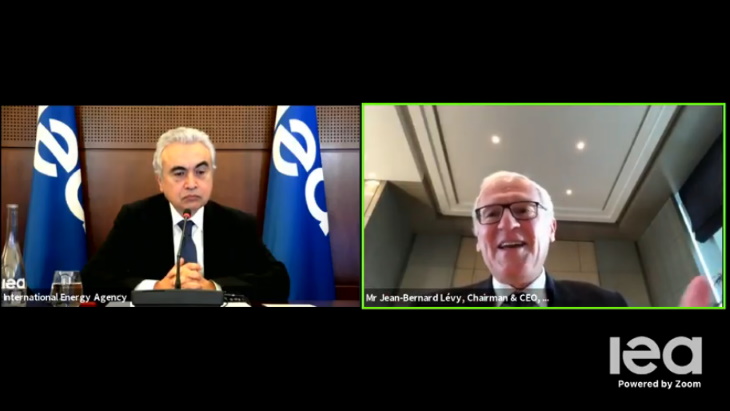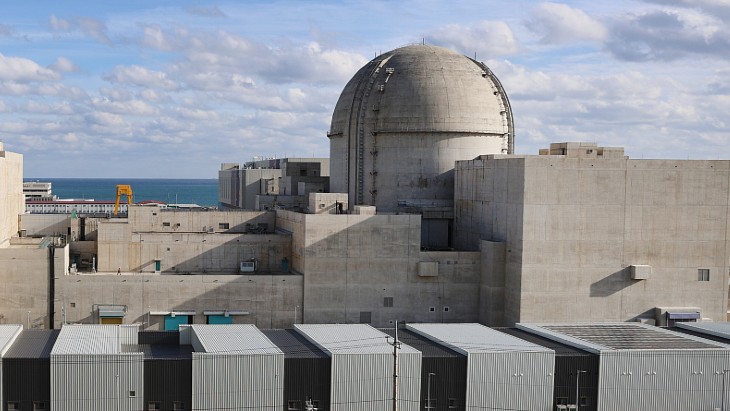Talking to Birol in the latest IEA Big Ideas speaker series chats, Lévy discussed the role of low-carbon electricity in reaching the goals of the Paris Agreement on climate change.
Birol noted that he recently talked with Frans Timmermans, executive vice-president of the European Commission, in the same series of interviews. During that chat Timmermans had stressed that the Commission “would not stand in the way” of EU Member States that support nuclear power. Birol stated that Timmermans said the EC was agnostic and "whatever technology brings emissions down we are happy, it is up to governments and companies to make the investments."
"I am happy to hear once again Vice President Timmermans talking about technology neutrality, being agnostic and so on," said Lévy. "Europe should move towards a technology-neutral vision and implementation for the taxonomy for the financial aspect of what is financed under the low-carbon policy, the Green Deal.
"Right now it is quite clear that several European states are not very happy with the bias they believe is in the draft of the taxonomy through the different approach to nuclear when compared with other low-carbon solutions," he said. "I think you need to be agnostic in terms of technology and only looking at the facts. What are the grammes of carbon that are being emitted by a megawatt of power generation should be the single goal of a low-carbon policy and not the taxonomy. As you know, this is not the case.
"From my different discussions with governments all through Europe, there are several governments that find it hard to understand why the Commission would not adopt a neutral approach to technology when at the same time there is an urgency to regarding climate that is being brought forward by each and every commission leader."
In March, the Commission published the final recommendations on the taxonomy by the technical expert group on sustainable finance, which included guidance to help investors and companies meet obligations for reporting against the framework.
In April, a group of more than 100 scientists and environmentalists wrote to Timmermans calling for a "timely and just assessment" of nuclear energy in the taxonomy. They wrote that nuclear currently provides more than 47% of the low-carbon electricity generation in the EU, and that nuclear also saves half a billion tonnes of CO2 emissions every year in Europe compared to fossil fuels. They said it is essential that assessing the taxonomy's Do No Significant Harm criterion for nuclear remains strictly technical, evidence-based and is conducted by qualified experts.
Lévy said there is growing interest in some European countries in building new nuclear generating capacity. Some of these are countries that have relied on coal-generated electricity for many decades, such as Poland. Other are countries like the Czech Republic, that while having nuclear plants still rely heavily on coal plants as well.
"We count about 10 European countries that are no doubt counting on nuclear to bring them a large part of the solution to the Paris Agreement goals and we believe that this does mean nuclear is part of the solution, we never believed it is the only solution," he said.
Birol noted that countries such as the USA, Canada and the UK are moving forward with the development of small modular reactors (SMRs) and asked Lévy for his opinion on these.
"We have launched an SMR project. We are working on the basic design of this SMR project," he replied. "EDF is leading it with other French partners in order that there is a French SMR project, that there is a French option in the emerging world of SMRs."
However, he said it is too early to say whether several SMRs will bring more value, be less costly, will be more flexible, easier to maintain and, in terms of life-time costs, will be anything that can compete with large-scale nuclear reactors. "It is promising," he said. "Right now all existing SMR projects are financed by government and not financed by market forces. This is not a market-driven business - this is a government-funded business. But maybe in 5, 10 or 15 years' time, people will say yes, we do have the knowledge of the ability of SMRs to compete with large-scale reactors ... But we want to give it a try, like others do."





_72306.jpg)


_49562.jpg)





